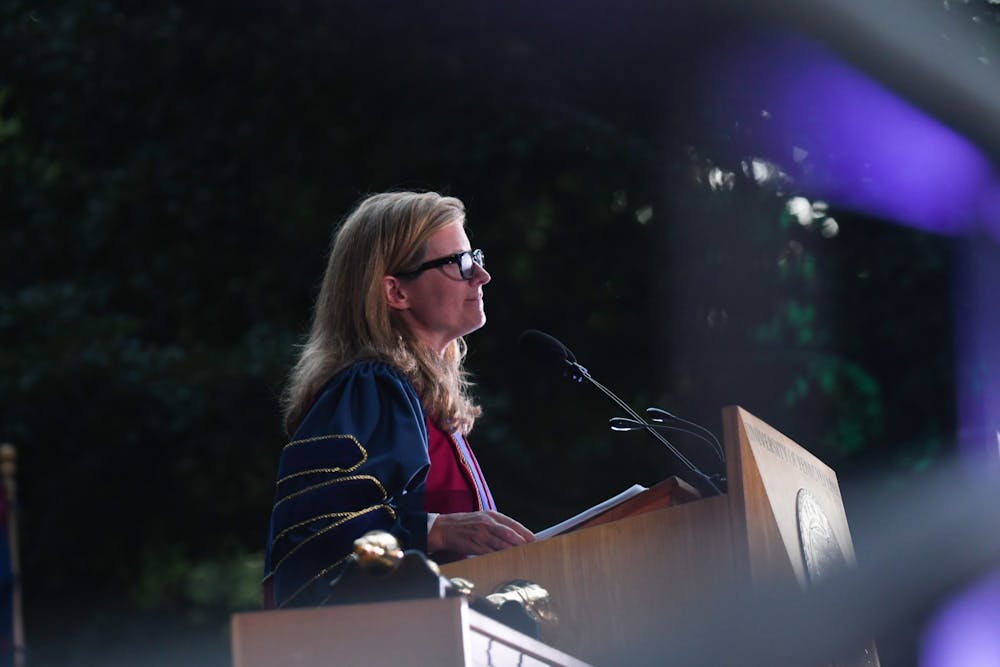
President Liz Magill speaking at the 2022 Convocation.
Credit: Anna VazhaeparambilLet's cut to the chase. Instead of asking what the world needs from Penn, let's ask what Penn can gain from the world. In an effort to plan Penn's next 100 years, Liz Magill has set out to create a committee with this goal in mind. But what about today? I must be realistic and say that I, as a first-year student, want Penn to have big goals for the future. But what about the present? What can the university do immediately to foster the culture that they want to create? How do we even define that culture?
Opening my email on the Oct. 11 and reading this message from President Magill, I was confused as to what the point of it was. Instead of using direct language, Penn uses extensive jargon that seems thick with meaning while simultaneously being quite vague. For example, instead of listing their goals, they list "recommendations for potential areas of strategic priority." When placed among recent controversies and protests that the University has found themselves entrenched in lately — including threatening students with disciplinary action for protesting at convocation — the timing of this announcement is strange when instead of addressing existing issues that impact the student body, we are instead focusing on the entirety of the coming century.
I understand that change takes time, and I am not unhappy that the university wants to make the future a priority. But I do feel that creating a committee tasked with planning the next century of Penn's involvement with the world does a disservice to short term engagement and planning, which is arguably much more impactful to the current student body and community.
Rather than acknowledging any of the student actions that have been going on directly on our campus — some for as many as 39 days straight, 24 hours a day — all undergraduates received an email about this new initiative, which feels very removed from the current things students care about or even witness on campus. For reference, all it took was strolling down Locust Walk anytime between mid September and late October and you would have seen the Fossil Free Penn encampment. Funny enough, the encampment was placed on the same spot that convocation was held, where Magill spoke to the importance of productive disagreement and diversity of thought before being interrupted by protesters.
In my opinion, there is more that the university — and Liz Magill herself — can do currently to assist and acknowledge Penn’s community and impact on the world. Students want to be heard and not threatened with penalization for speaking up about what they believe in, and Liz Magill should be open to listening.
I reached out to the Red and Blue Committee about this initiative and received a response which stated that the committee will meet with the Undergraduate Assembly for input on their path forward. I believe that consulting the Undergraduate Assembly is a step in the right direction, but in order to truly be inclusive to the school community more could be done. For example, holding things like open forums and referencing what student actions are taking place on campus and social media is also just as crucial.
Beyond asking broad questions such as “In pursuing our missions, how can we maximally contribute to our city, nation, and the world?” How about we ask what students need to feel safe and supported on campus, how the university can contribute to student run initiatives, and in turn, foster student leadership on campus? In asking these questions subsequent contributions to the greater world will most definitely arise.
Rather than formulate a committee to address what Penn can contribute in 100 years, how about we address what we need, and better yet, what we can do to begin that process now? When Magill spoke to us first years at convocation, she spoke of the importance of diverse backgrounds and viewpoints. While I do believe that she meant these words, change starts from within — and that means acknowledging Penn’s faults before analyzing what we have to offer the world.
In my eyes, that means starting a little bit smaller and first forging a foundation for these conversations to take place on campus — and in the effort to encourage these diverse perspectives, include residents of West Philadelphia in the discussion. And by include, I mean actively seek out those members of the community, not simply display empty statements like a “Penn welcomes the opinions and input of the wider community that cares about Penn’s path forward” clause in the Tomorrow, Together FAQ. Residents of West Philadelphia are part of the Penn community and more than deserve a seat at the table.
I believe rather than asking what the world needs from Penn, we should take our ego down a notch and instead ask what Penn needs to do in order to become a place in which the world can look to us for consequential answers regarding things like fostering diversity and uplifting differences. Right now, I do not believe we possess them — but we are in an ample position to start looking.
MIA VESELY is a College first year studying philosophy, politics, and economics from Phoenix, A.Z. Her email is mvesely@upenn.sas.edu.
The Daily Pennsylvanian is an independent, student-run newspaper. Please consider making a donation to support the coverage that shapes the University. Your generosity ensures a future of strong journalism at Penn.
Donate



